Explore our Progress 2050 Goal Tracker
“How we develop, apply and adopt emerging technologies and how we make use of data will fundamentally shape Australia’s future economic and social development. CEDA’s mission is to positively shape that future. The aim of our public interest technology agenda is to promote the development, take-up and use of technology and data in a way that enables a dynamic economy and maximises individual and community choice, opportunity and wellbeing.” CEDA CEO, Melinda Cilento setting the scene for the inaugural CEDA Public Interest Technology forum.
Hilary Sutcliffe, SocietyInside and co-director of the WEF TIGTech program framed the session with an opening question, “what would change if the governance of technology were to consciously consider the earning of trust?”
Hilary began by outlining critical aspects of trust, why it is important and how it is shaped. Hilary’s key observations included that:
- ‘Trust makes the world go around’ - we all make many ‘trust’ decisions every day and this makes life easier, while distrust does the opposite, bringing day to day interactions and transactions to a grinding halt;
- Trust and trust decisions are complex and influenced by many factors including the context in which they are made. For instance, who we trust and the trust decisions we make during a pandemic may be different to business as usual decisions;
- Trust feeds on trust, and distrust breeds distrust; and
- The more doggedly trust is pursued for its own sake, with a focus on “trust me” rather than why trust matters and how it is earned, the more elusive it becomes.
Hilary concluded that ultimately, “trust is about meeting expectations…and the best way to earn trust is to be trustworthy and provide evidence that you are.”
Understanding expectations is therefore critical to trust and Hilary noted that “people are more likely to trust decisions that involved citizens” as opposed to those that are made behind closed doors.
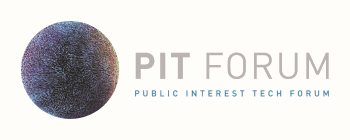 The importance of regulators and those charged with governance of tech using their voices to champion public interest (good intent with empathy), in plain language and in the spotlight was an important theme. Hilary noted that regulators need to “be more human, more visible, and help us to help ourselves” and endorsed the conclusion of PA Consulting in their Rethinking Regulators report, that “regulators should move from being watchdogs of industry to champions of the public”.
The importance of regulators and those charged with governance of tech using their voices to champion public interest (good intent with empathy), in plain language and in the spotlight was an important theme. Hilary noted that regulators need to “be more human, more visible, and help us to help ourselves” and endorsed the conclusion of PA Consulting in their Rethinking Regulators report, that “regulators should move from being watchdogs of industry to champions of the public”.
Hilary explained that the best way to earn trust in tech is to first avoid doing the things that people inherently distrust, and then expressly consider in tech decision making the seven key trust drivers identified in the TIGTech report, namely:
- Public interest
- Respect
- Fairness
- Inclusion
- Competence
- Openness
- Integrity
The TIGtech report also identified three key competencies for tech governance in the future: communicate, listen, co-create. Co-creation in turn will require building trusted collaborative governance processes and capabilities.
In concluding Hilary drew on the lesson of the most trusted regulator in the UK, the Food Standards Board and their experience in rebuilding trust following Mad Cow disease and other high profile scandals. Openness has been critical to that, with all Board meetings now held publicly allowing the public to ask questions which need to be responded to within 48 hours if they cannot be addressed during the meeting.
Her final comment, “trust is bestowed and earned”.
Watch the discussion
Poll questions
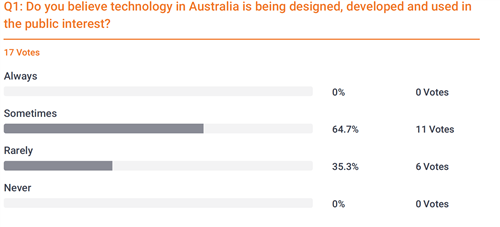
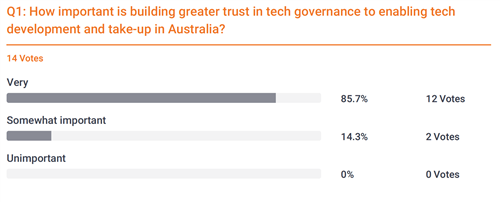
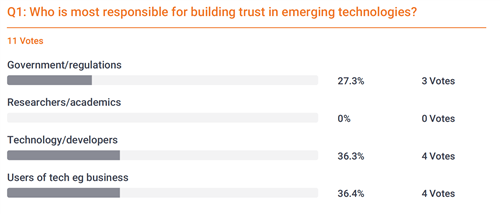
KPMG live-scribe
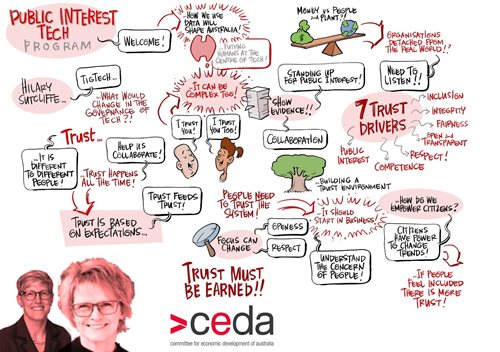
CEDA's PIT Forum was supported by our Foundation Partners:




Have some thoughts?
Share them with us
Use the form below to submit your comments to our platform. Please refer to our blog terms and conditions.